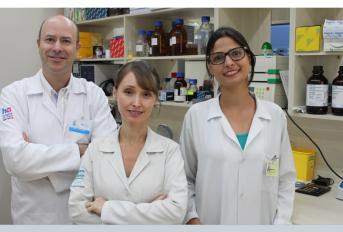Associação Portuguesa de Investigação em Cancro
Euphol, a tetracyclic triterpene from Euphorbia tirucalli, induces autophagy and sensitizes temozolomide cytotoxicity on glioblastoma cells
Euphol, a tetracyclic triterpene from Euphorbia tirucalli, induces autophagy and sensitizes temozolomide cytotoxicity on glioblastoma cells

The research that was developed at Barretos Cancer Hospital (Brazil) in collaboration with the ICVS of the University of Minho, was a partnership with the company Amazônia Fitomedicamentos Ltda and revealed mechanisms of action involved in the cytotoxicity promoted by the euphol molecule, obtained from the Brazilian biodiversity in glioblastoma cells. One of these mechanisms was the induction of autophagic process, which also contributed, in parts, to potentiate the effect of the chemotherapy used in clinical practice, temozolomide. In addition, euphol administration inhibited cell proliferation and cell migration in vitro, in addition to having an antitumor and antiangiogenic effect in vivo, in the chicken chorioallantoic membrane model. These results suggest euphol as a novel antineoplastic agent that also has therapeutic potential for adjuvant treatment of cancer.
Authors and Affiliations:
Viviane A. O. Silva1; Marcela N. Rosa1; Vera Miranda-Gonçalves2,3; Angela M. Costa 2,3; Aline Tansini1; Adriane F. Evangelista1; Olga Martinho1,2,3; Adriana C. Carloni1; Chris Jones 4,5; João Paulo Lima6; Luiz F. Pianowski7; Rui Manuel Reis1,2,3
1 Molecular Oncology Research Center, Barretos Cancer Hospital, Barretos, São Paulo 14784 400, Brazil
2 Life and Health Sciences Research Institute (ICVS), School of Medicine, University of Minho, 4710-057 Braga, Portugal
3 ICVS/3B’s - PT Government Associate Laboratory, 4806-909 Braga, Guimarães, Portugal
4 Division of Molecular Pathology, The Institute of Cancer Research, London, UK
5 Division of Cancer Therapeutics, The Institute of Cancer Research, London, UK
6 Medical Oncology Department, AC Camargo Cancer Center, São Paulo 01509-010, Brazil
7 Kyolab laboratório de pesquisa Farmacêutica Ltda, Valinhos, São Paulo 13273-105, Brazil
Abstract:
Glioblastoma (GBM) is the most frequent and aggressive type of brain tumor. There are limited therapeutic options for GBM so that new and effective agents are urgently needed. Euphol is a tetracyclic triterpene alcohol, and it is the main constituent of the sap of the medicinal plant Euphorbia tirucalli. We previously identified anti-cancer activity in euphol based on the cytotoxicity screening of 73 human cancer cells. We now expand the toxicological screening of the inhibitory effect and bioactivity of euphol using two additional glioma primary cultures. Euphol exposure showed similar cytotoxicity against primary glioma cultures compared to commercial glioma cells. Euphol has concentration-dependent cytotoxic effects on cancer cell lines, with more than a five-fold difference in the IC50 values in some cell lines. Euphol treatment had a higher selective cytotoxicity index (0.64–3.36) than temozolomide (0.11–1.13) and reduced both proliferation and cell motility. However, no effect was found on cell cycle distribution, invasion and colony formation. Importantly, the expression of the autophagy-associated protein LC3-II and acidic vesicular organelle formation were markedly increased, with Bafilomycin A1 potentiating cytotoxicity. Finally, euphol also exhibited antitumoral and antiangiogenic activity in vivo, using the chicken chorioallantoic membrane assay, with synergistic temozolomide interactions in most cell lines. In conclusion, euphol exerted in vitro and in vivo cytotoxicity against glioma cells, through several cancer pathways, including the activation of autophagy-associated cell death. These findings provide experimental support for further development of euphol as a novel therapeutic agent for GBM, either alone or in combination chemotherapy.
Journal: Investigational New Drugs
Link: https://link.springer.com/article/10.1007%2Fs10637-018-0620-y




